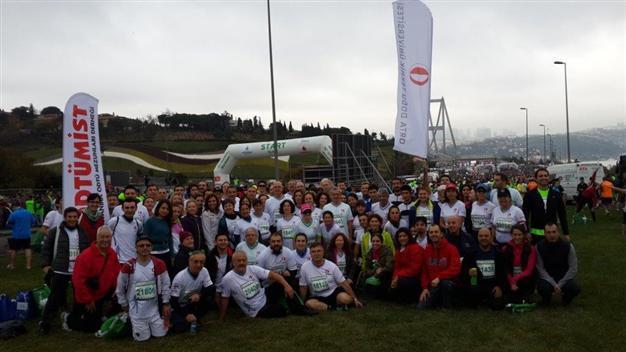BLOG: Peace is victory: From the Athens marathon to the Istanbul marathon
Semih Kumluk

It is known in the modern world that the olive branch symbolizes peace. In many places where a peace agreement was signed between countries, there is a dove holding an olive branch in its beak. An example used to stand in Mudanya where a peace agreement ending World War I was signed.
In Ancient Greece, the olive was the sign of Athena. She is the patron goddess of Athens and she presented an olive to Athens as a gift. Athena is the goddess of war strategy and wisdom. Olive in her inventory of symbols stands for victory. It is believed that Athena supported the Athenians in many wars for victory, and they offered their gratitude to her by building statues of victory in the places of war. These statutes mostly show the goddess of victory, Nike (Victoria in Roman mythology) holding an olive wreath in one hand. In many cities of Europe, statutes of the goddess of victory still stand to honor their victories. An example stands in Copenhagen, representing a victory they won using the guns of a sunken ship against the Germans.
An olive laurel is also offered to Olympic champions in modern Olympic Games, as was done in the ancient games of Olympia and other Greek cities. Homer honored the games by saying, “There is no greater glory for a man as long as he lives than what he achieves by bare hands and feet” in “The Odyssey.” The Olympic Games still protect its values: friendship, respect, excellence and its motto, Citius, Altius, Fortius (faster-higher-stronger).
I experienced a combination of these during the Athens Marathon, “The Authentic,” I did on Nov. 9. The marathon is the race with the distance that the Athenian soldier ran to inform the city about their victory against the Persians in the city of Marathon before collapsing. We ran the original course the soldier ran around 2,500 years ago. The race starts in Marathon where a Nike statue symbolizes their victory and wishes luck to all the marathoners and ends in the Panathenaic stadium in Athens where the first modern Olympic games were held in 1896. At almost every stage of the race, local people were standing by the road and motivating the runners. Around the fifth kilometer of the race, an old lady standing by the road offered me an olive branch. That was by far the kindest thing that ever happened to me. I carried it for the remaining 37 km; I crossed the finish line with it and still keep it in my house. For me, that branch means many things: peace between our countries, my victory by starting the journey of another marathon, my finisher’s medal that showed I can go the distance and a torch of peace...
I ran in the Istanbul Marathon as well as on Nov. 16 over the bridge connecting Asia and Europe. I completed both races for fundraising purposes as well. I am offering an olive branch to all the participants of this year’s event who connected the two continents by running, and to everyone who donated to my causes. And I would like to invite all the runners around the world to run in our marathon in Çanakkale next year (the 100th anniversary of the Gallipoli war) in which we will again “run for peace.”
 It is known in the modern world that the olive branch symbolizes peace. In many places where a peace agreement was signed between countries, there is a dove holding an olive branch in its beak. An example used to stand in Mudanya where a peace agreement ending World War I was signed.
It is known in the modern world that the olive branch symbolizes peace. In many places where a peace agreement was signed between countries, there is a dove holding an olive branch in its beak. An example used to stand in Mudanya where a peace agreement ending World War I was signed.